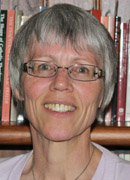By Barb Arland-Fye

My mother named me after her best friend, Barbara, a Lutheran. The year was 1958, and Mom doesn’t recall whether the two had ever discussed religion. I raised the subject with my mother during the Week of Prayer for Christian Unity (Jan. 18-25) out of curiosity about her experience with ecumenism. As it turns out, she shared a fascinating memory from her childhood.
She and her siblings and the other kids in their neighborhood all played together in a lot beside an apartment building. The Catholics attended St. Cecilia’s and the non-Catholics attended the public Baker’s School. All of them got along fine, and religious differences never came up.
Then, one day, one girl asked my mother: “Do you want to go to Sunday school with me?” Mom said she responded, “Oh, I’ll go ask my mother.” She went home to ask her mother, who responded (but not in an angry way): “Catholics can’t go to non-Catholic churches.” Mom went back outside and told her friend, “Catholics can’t go to non-Catholic churches,” and the friend said, “Okay,” and they continued to play.
But after a while, my mother said she wondered, “Why can’t Catholics go to non-Catholic churches? I remember there was a (Protestant) church that wasn’t too far from us, and I used to wonder, what was it like inside that church?” So, Mom went around to the back of the church, and stacked up some fallen tree limbs to try to peek into the window. “I still couldn’t see inside.”
We’ve come a long way since those days when my mother couldn’t even get a peek inside a non-Catholic church. Credit goes in large part to the work of the Second Vatican Council, which through the inspiration of the Holy Spirit, created the Decree on Ecumenism. That document celebrates the 50th anniversary of its promulgation later this year.
“The restoration of unity among all Christians is one of the principal concerns of the Second Vatican Council. Christ the Lord founded one church and one church only,” begins the Decree on Ecumenism, promulgated Nov. 21, 1964. I was 6 years old at the time, but the decree has had a big impact on my life as an adult.
In the late 1990s through 2001 I served as religion editor for The Quad-City Times and became immersed in learning about and reporting on significant religious issues of the day. I interviewed Catholics, Lutherans, Methodists, Presbyterians, Baptists, Evangelical Christians, Jews, Buddhists, Hindus, Muslims and individuals of other faiths.
I met my close friend, Marcia Chambers Regrut, while covering religion for The Times. Marcia is an Evangelical Christian who is Anglican. She often attended Mass with me and my family, and when I joined The Catholic Messenger she volunteered as a proofreader until moving to Colorado. In turn, I attended services with her at her church. We prayed together, shared our stories of faith and discussed our beliefs in depth.
Our lives have been enriched by our faith sharing, and Marcia’s deep knowledge of and appreciation for the Catholic Church has enhanced my appreciation of both of our churches.
“We have a jumping off place, a place where we agree totally,” Marcia said to me tonight over the phone. “It’s very enriching to look into what other people embrace.”
At the same time, Marcia remains committed to her faith community. “My children, as Baptists, can come and have the Eucharist with me in the Anglican Church and I can have Communion in the Baptist Church. That would not happen if I were Catholic,” she noted.
The Decree on Ecumenism speaks to the centrality of the Eucharist in the Christian faith, and paradoxically, we Christians have made the Eucharist a dividing point. Through prayer and continued dialogue, I hope we can move closer to the unity Jesus asked of us.
“ … [T]he reconciliation of all Christians in the unity of the one and only church of Christ — transcends human powers and gifts,” the Decree on Ecumenism says. ‘And hope does not disappoint, because God’s loved has been poured forth in our hearts through the holy Spirit who has been given to us (Rom 5:5)” (no. 24, “Decree on Ecumenism”).
I’m grateful there’s nothing now that would prevent my mother from talking freely about faith with her friend, and even praying together.







